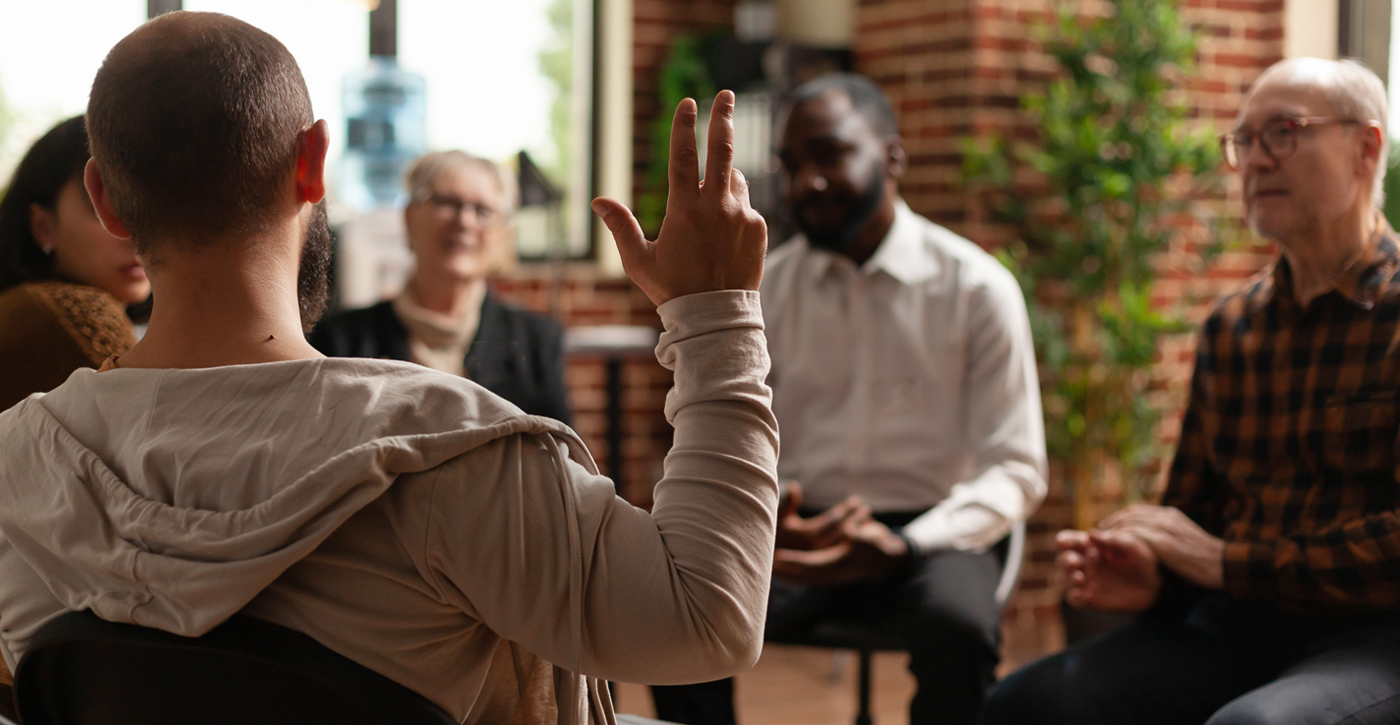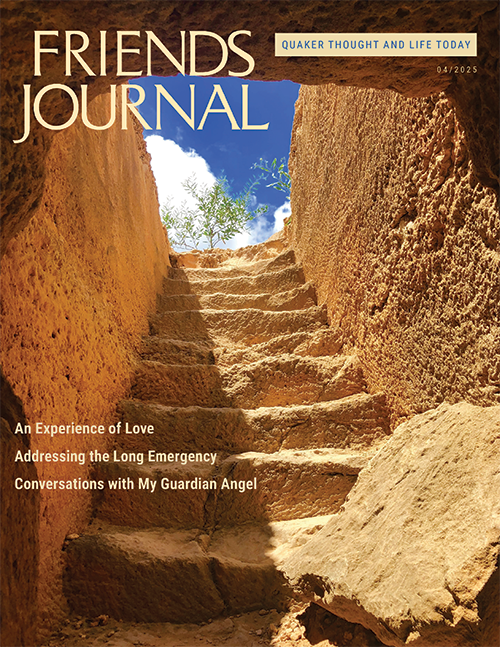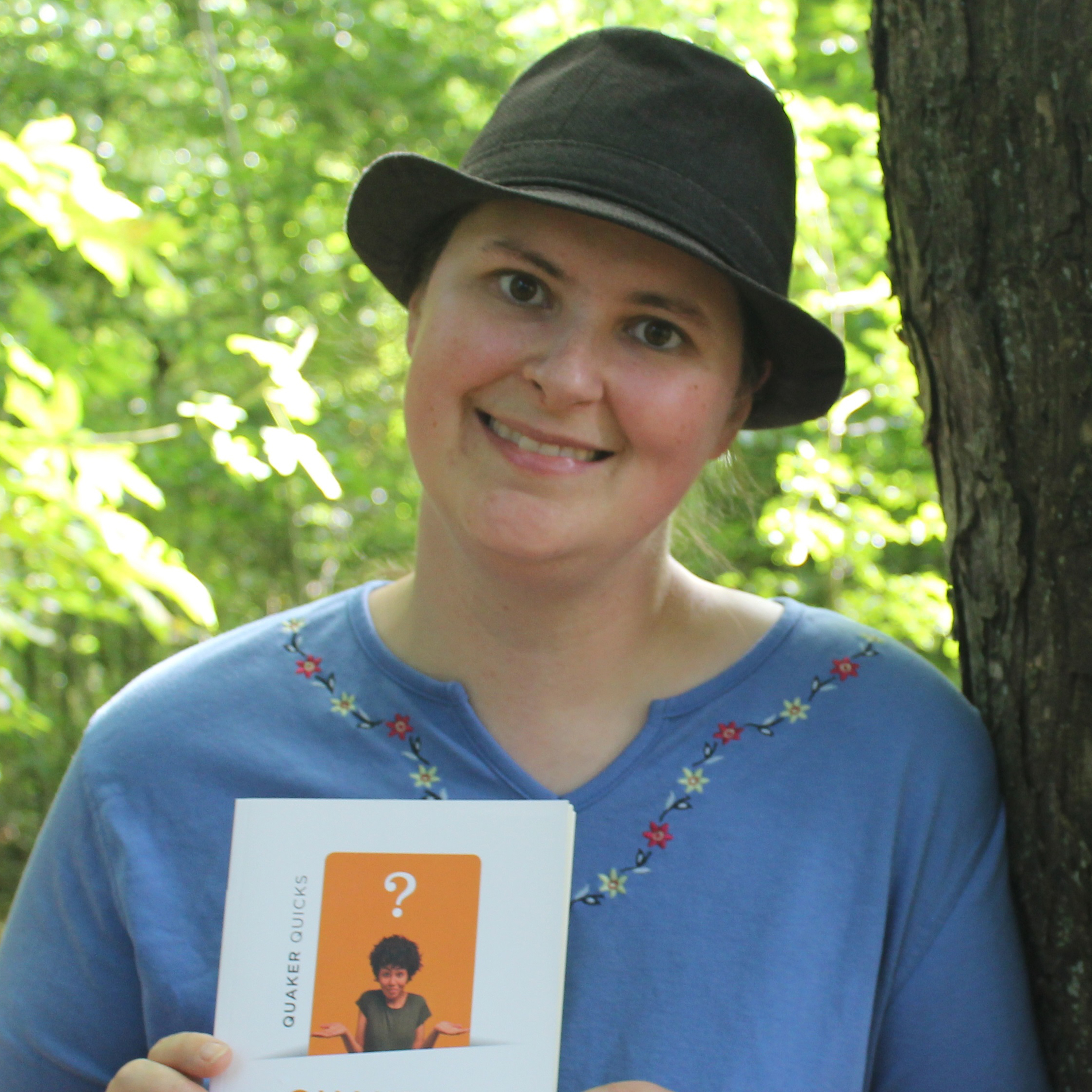Assessing Our Rules About Vocal Ministry
When should we change the rules about speaking in meeting for worship? If the main rule about this practice, sometimes called “giving ministry” or “sharing a message,” is that we feel led by the Spirit to speak, the obvious answer is that we can change any of the other rules when we are led to do so. However, it can be hard to hear even a clear, inward voice asking us to do something that we’ve never considered to be possible. My prophetic goal in this article is to present some more or less radical possibilities for change, which you can test against the promptings which love is currently giving to you and your community.
In some situations, we may simply have too many rules. Giving and receiving messages in an unprogrammed meeting for worship is a mysterious and beautiful aspect of our Quaker practice. I think it can bring us into very close contact with the Divine within ourselves and each other. It can be completely natural for us. Like many other things in the natural world, it can also seem deeply weird; it can be the location of anxiety and uncertainty. When I facilitate discussions about Quaker worship, people often have questions about spoken ministry. How much is too much; how little is too little; what is allowed or not allowed; what should we control about it; and how do we do that?
To some extent, that uncertainty is an integral part of the process of unprogrammed worship, which ought to be unpredictable, at least to the human mind. This uncertainty can also prompt us to try to control the situation, especially to set up rules, guidelines, or bylaws that try to address one problem but risk creating others. It’s tough to trust ourselves, other people, and the Light to avoid making any plans at all about how our worship should go, but sometimes the rules we make have unintended effects. For example, if we talk too much about the need to feel physical symptoms of being called to speak—shaking or being pushed to our feet—we may set up an expectation that prevents people from speaking, if they were to experience the call in a different way. If we stick too rigidly to a rule that everyone must stand, we lose the ministry of people for whom that’s not practical and or those for whom it’s physically possible but psychologically much too daunting.
Instead of setting up these kinds of rules, what could we do instead?
Watch and wait; wait and watch. This is not a radical suggestion; it’s at the heart of unprogrammed worship, in which we open ourselves through silence and stillness: both inward and outward—to whatever degree we can achieve it—in order to listen to whatever emerges.
When we are challenged by someone’s ministry, there can be a temptation to leap into action. Sometimes this is part of the flow: fully immersed in the current of the meeting for worship, we add to someone’s ministry with our own, even if that means telling someone they have been heard and we now need quiet, asking them to leave the room with us, or stating that a harmful viewpoint is not shared by the community. But if it doesn’t come as part of the flow, it may be better to return to the center of the worship and wait.
If we do need to dive into something, we could choose curiosity. The river of meeting for worship contains many aspects: the Living Water, which carries us along but also the banks; riverbed; any boats or floats we bring with us, ways to get in and out; a Source which may seem distant or close; and, at the far end, a great Ocean of Light, which we may be suddenly approaching or never experience. Considering this whole picture, we can ask many questions about a particular message or a pattern in the ministry our community hears: How do I, or we, feel when we hear these messages? How does this ministry move us in relation to our spiritual journey? Are we welcomed into a faster or a warmer current, stranded on mud flats, surrounded by playful fish or dangerous ones, or safely in the flow or fighting to get out?
In the same way that we test messages to see if they are for us as individuals or for sharing, I can ask whether my response to ministry is information for me alone or for the community. In the same way that we are in a discernment process, we might look for a pattern of signs that point to a direction of travel or try to disrupt a socially conventional pattern by going beyond it. In reflecting on the ministry we receive in meeting for worship, we might ask whether we are being shown something through a pattern or whether the pattern is hiding the real message.
Let me give you an example. I can remember being very upset by some ministry that felt deeply personal and attacking. I felt convinced that I was seen to be doing something wrong, even though I also felt that I didn’t have the power to change it. I cried. I could have lashed out. Sitting with it in worship, I asked questions about it: Where is this coming from? What feels Spirit-led, and what is from elsewhere? What else do I know about the situation that might allow me to make sense of it? In that questioning process, it became clear that however personal it felt, a message given to the entire yearly meeting was only aimed at me in the sense that it was indeed God speaking to my condition, and at some level I had known that all along. It was a hard message to hear because the request to give what we can also brought up for me things that were not from God at all: assumptions from the society in which I live that people earn their worth by earning money and assumptions from my ego that I should be actively involved in getting everything done. I am called to give what I can to my community. I was not, at that time, called to give more money.
Messages that are true and give genuine insight can come in many forms. Traditionally, we speak or maybe sing. Traditionally, we stand to speak, partly to be visible and partly to project our voices. More recently it’s been common to use a microphone, to start by unmuting yourself on Zoom, or otherwise use technology to enable and improve the communication. All of these usually focus on speech. Sometimes ministry might be given deliberately through movement, drawing, or other art forms. Accidental contributions, like a baby’s cry or a bird’s song, are sometimes recognized as ministry. Depending on the timing and location of the worship, more challenging gifts can be welcomed by some Friends as part of the diversity of the meeting such as sounds of a washing machine, an ambulance siren, a drunk party-goer, or of someone being arrested.
When we recognize the value that everything brings to our worship, we can still appreciate the silence but also be open to different types of ministry. For example, people often worry that ministry is too political. I’m sympathetic to this. Although I do pray for guidance on the way to vote and other political questions, I think that an election campaign message is likely to be divisive and the details are unlikely to be directly from God, even if the general points are heartfelt. However, I worry that this rule prevents other messages that we should be hearing: messages that name a politician as a jumping-off point rather than an endorsement, messages that are about people’s everyday experience that can’t be separated from the political and may reveal the movement of the Spirit in their lives. This is especially so for ministry from members of our community who are marginalized in various ways and seen as “political” or “angry,” even though a well-off White cis man who brought the same message might not be perceived in the same way.
When ministry presents challenges to the community, we sometimes set up new rules. We don’t want meeting for worship to run past the pre-arranged time, and we feel overwhelmed if several people wait until almost the end of worship to speak. So we ask people not to speak near the end “when it was well left before,” which can then become “not in the last five minutes” and then “not in the last ten minutes.” If we then discourage people from speaking in the first 15 minutes when latecomers still might be arriving and people are centering down, we can get our open worship down from an hour to 35 minutes and drastically reduce the risk that anything really difficult and Spirit-led will be able to get through! If we make sure everyone leaves a gap of at least ten minutes between messages, we can avoid hearing more than three things on a Sunday morning. We could consider other rules, such as those about not speaking twice, about keeping ministry short, about avoiding certain language, about not being too emotional, and so on. These rules may arise from good intentions and protect us from some kinds of harm, while at the same time, they may prevent us from finding exactly the thing we came seeking in unprogrammed worship. Love is messy. Light shines, and warmth spreads in all directions. Life might be neater, but we would be poorer if we could put God in a tidy box.
Changing the rules of ministry in meeting for worship doesn’t just mean stripping away extra rules, although I hope I’ve demonstrated that it might be useful to do that. It can also mean considering what rules we should adopt in order to bring authentic, Spirit-led ministry into our meetings. I think of this activity as similar to cultivating a garden. There’s a fair amount in a garden that is outside the gardener’s control: we can’t force a plant to flower. In the same way, we can’t make God give someone a message. What we can do is try to create the right conditions: the water, the light, the shelter, and the temperature, knowing the plant and its needs. Perhaps by the sort of curious questioning I described earlier, we can make it more or less likely that flowers will grow. In cultivating ministry, that might mean developing our responsiveness to leadings and promptings in all areas of life.
For some people, speaking in meeting functions as a practice ground in which we learn the feeling of being led. After all, if we make a mistake and either outrun our Guide—speaking more or sooner than we should—or if we ignore a prompting and don’t share a message, it’s unlikely to lead to death, misery, or financial ruin. It can be deeply uncomfortable, but the risks of each specific decision are somewhat contained. (Sometimes we find that it was useful anyway: the extra words had given someone else a clue to the way forward, or an unspoken message was given by someone else.) But we can also look at it the other way around: thinking about the way in which practicing discernment in other areas of life (holding up to the Light all sorts of questions about our daily choices) can help us to hone that skill and be ready to speak if the leading comes. In a similar way, we might consider how to develop in ourselves and our communities other skills relevant to giving authentic ministry: expressing ourselves in multiple ways, including through words and art; building trust; getting used to sharing; being vulnerable; holding boundaries; and making meeting for worship itself accessible, so there are people present to listen and be led.
Ultimately, the rules for meeting for worship should enable us to be fully ourselves and ready to be somebody new. The emphasis on rules about ministry to share only what is Spirit-given and not from the ego can lead to a sense that all the messages should match in some way. Perhaps real ministry does at the deepest level all point in the same direction: towards peace, justice, and love. That doesn’t mean messages should match in tone, grammar, language, or experience. It doesn’t mean they should come in standard English and in a calm manner without hand-flapping, dialect words, tics, stutters, or whatever other variations come with our authentic forms of communication. Giving ministry that arises from our real selves is not egotistical but real: as children of God, we are loved exactly as we are. It can be difficult to feel and show that love in community because, of course, we are also flawed humans, but we are loved in that too! Our spiritual experience is part of our bodily experience, our thoughts, and imaginations, and our sharing in ministry will be richer when we can share the whole picture.
When we give ministry, we can also be transformed. The Bible has a number of stories of people who were given new names when they encountered God. As we share our selves, those selves are changed by the contact with divine love in community. Sometimes suddenly and sometimes slowly, we become new people: one person may become pacifist when they couldn’t take that position before; another is called to new work; another starts a new spiritual practice and finds a leading to speak in meeting for the first time; another may find the strength to continue when being close to giving up; someone else gains the courage to tell the truth. How do we as communities move towards that ideal while explaining our aims and practices clearly and, at the same, ensure we’re not getting in our own way by setting up unnecessary rules that prevent us receiving messages we need? By acting as a channel for God’s love and accepting the leadings of the Spirit to give a message to the community, we can both value our reality as we have it now and be open to an ever-expanding palette of possibilities.






Wonderful words and wisdom on worship and spoken ministry. (Or in some circumstances, as Ben Pink Dandelion once said, ‘if in doubt do’)